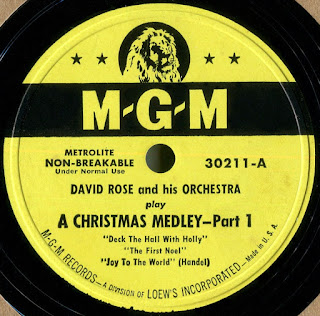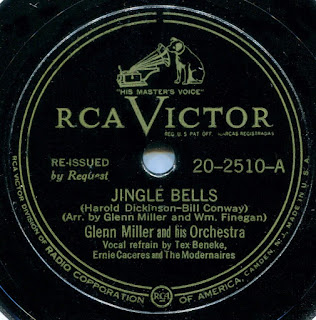I thrifted this during my three day internet-withdrawal period, and I apparently got a great deal at 99 cents--it's at Discogs in Poor condition for $56.00 (Can the dealer be serious?), and it doesn't show up at all on eBay. My copy has some moisture damage to the back jacket but is otherwise fine. Such a tacky-cool cover photo, and if the copyright year shown on the back cover is the year of release, then this is from 1957 (Design's first year). This is quite possible, since the label is in the earliest style, complete with the promise of "Stereo Sonic Sound," which this disc does not deliver--the tracks are all mono. Stereo didn't happen at Design until the early 1960s, apparently, but I guess Pickwick Sales Corp. figured no one would sue. I can picture a Design engineer saying to the label makers, "Anyone who buys this junk isn't going to know what stereo is. So, don't worry." Label makers: "But you guys are liable if someone gripes, right? Right? Right? Hello?"The tracks, all released as singles or EP tracks on Pickwick's Cricket and Playhour labels (and who knows where else), date back to 1953 or earlier (I suspect A Christmas Carol is pre-1953), and I'll have to say they're well performed and produced--surprisingly so, given that 1) they're from the early 1950s and 2) products of Pickwick. I've always had a less than glowing opinion of Pickwick's kiddie stuff (Cricket, Playhour, Happy Time), but maybe that's because of the highly uneven quality of the pressings, plus the fact that Pickwick re-re-re-reissued its tracks in greater numbers than SPC and Waldorf combined. But hearing these tracks all packed into a single album has me reevaluating the Pickwick kiddie line. I suppose these could be considerably worse. The singers are good, the super-condensed version of A Christmas Carol is fun and nicely spooky (it's like a Classics Illustrated version of a Classics Illustrated version), and Ding Aling Dong, The Sleighbell Song (aka, Ding-A-Ling Dong, The Sleigh Bell Song) remains one of my favorite cheap kiddie holiday numbers. Plus, we get the ad-jingle-sounding Tinker Town Santa Claus, which I first heard in its 1970s Playhour Records edition, and I've Got Eighteen Cents, an annoying number sung by Rosemary Jun (1928-2016), whose real name was Rose Marie Jun, and who can't be blamed, since she didn't pen the thing. Rose Marie, aka Rosemary, is credited on the back jacket, along with the Cricketones, Toby Deane, Norman Rose, and Linnea Holm, and the label lists the Cricket Children's Playhouse (which doesn't seem to have existed) and one Brett Morrison, who was actually Bret Morrison (1912-1978), and who, among others, played The Shadow on the radio.
DOWNLOAD: Christmas Is for Children (Design DLPX 2; 1957?)
Lee


















































